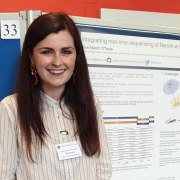The First PDG Seminar series has now finished. We will be setting up our next series later this year. Please contact pdgseminars [at] gen.cam.ac.uk (subject: PDG%20Seminars) if you are interested in attending or presenting. Details of the talks from the frst series can be found below.
The PDG Seminars are a series of research talks from the field of infectious disease dynamics. The talks are an opportunity for PhD and Postdoctoral researchers from different institutions to present their work on topics relating to infectious disease epidemiology, mathematical modelling and phylodynamics.
The seminars will usually take place Fridays at 15:00 GMT (UK time) via Zoom, with some flexibility to take account of time zone differences. The schedule for this first set of PDG Seminars is set out below.
They will run between January and April 2021. If you are intersted in attending these seminars, please e-mail pdgseminars [at] gen.cam.ac.uk (subject: PDG%20Seminars) .
8th January 2021
Qifang Bi, Johns Hopkins University
Title of talk: Household Transmission of SARS-COV-2: Insights from a Population-based Serological Survey
Abstract: This study uses data from a household-based serosurvey in Geneva to estimate extra-household infection risk and infection risk from exposure to an infected household member by demographics and infector's symptoms.
15th January 2021, NOTE DIFFERENT TIME FOR THIS TALK: 10:00AM GMT
Bingyi Yang, University of Hong Kong
Title of talk: Dynamics of human life-course antibody profile to influenza A(H3N2)
Abstract: Pre-existing antibodies against antigenically variable pathogens that arise from multiple infections over a life time interfere with immune responses to new exposures through both positive and negative feedbacks. Such complex interaction – analogical to ecological systems - may exhibit intrinsic temporal cycles but has not been investigated. This study reported the existence of intrinsic cycles in human antibody profiles of influenza A(H3N2) at both individual- and population-level using antibody profiles from a cohort in Guangzhou and found these cycles can be recovered by models incorporating cross-reactions between strains and the herd protection could recover these two cycles.
A paper from this work can be found here: https://journals.plos.org/plospathogens/article?id=10.1371/journal.ppat.1008635
Bio: I obtained my Ph.D. in infectious disease epidemiology from The University of Hong Kong and postdoctoral training in University of Florida with Prof. Derek Cummings. My research interest is understanding the transmission dynamics of infectious diseases with a focus on seroepidemiology.
22nd January 2021
Alasdair Henderson, London School of Hygiene & Tropical Medicine
Title of talk: Mathematical modelling of arbovirus outbreak dynamics in Fiji
Abstract: Diseases spread by the Aedes genus of mosquitoes are some of the fastest growing and fastest spreading viral pathogens in the world, including in Fiji and the wider Pacific. I conducted a serological survey in Fiji in 2017 and used these serological data, combined with mathematical modelling, to analyse transmission dynamics of arboviruses in Fiji. I found a diverse range of outbreak dynamics and serological responses to outbreaks of closely related dengue and Zika viruses in the same location. I found that both viruses can cause low level multi-year outbreaks as well as large single season epidemics. Despite these challenges, mathematical modelling can improve our understanding of arbovirus outbreak dynamics such that it is possible to accurately forecast outbreak dynamics in real-time.
29th January 2021
James Hay, Harvard University
Title of talk: Using viral loads to improve COVID-19 surveillance
Abstract: Virologic testing has been central to tracking the COVID -19 pandemic. Most routine tests provide a quantitative result in the form of a cycle threshold (Ct) value—a metric proportional to the log viral load. These data are usually reported as a binary result, thereby removing much of the information inherent in the full quantitative value. We propose that, despite their caveats and variability, the Ct value is a useful measure that can be harnessed to improve public health surveillance. I will present three projects that combine mathematical models and an understanding of viral kinetics to generate insights into surveillance testing, efficient sample pooling and reconstruction of epidemic dynamics.
Bio: I completed my PhD with Steven Riley in 2019 at the Department of Infectious Disease Epidemiology, Imperial College London, where I developed methods to infer antibody kinetics, infection histories and epidemic dynamics using serological data. I have since been a postdoc in CCCD at Harvard SPH working with Michael Mina on COVID -19 testing (though I was meant to be using epitope-level serological data to study population immunology).
5th February 2021
Sam Hong, KU Leuven
Title of talk: Challenges in SARS-CoV-2 Bayesian phylodynamic inference using BEAST
Abstract: Thanks to an unprecedented effort by laboratories around the world, there are now over 400,000 SARS-CoV-2 genomes available to the scientific community. Although this large amount of annotated genetic data presents us with a unique opportunity to learn about the ongoing evolution and spread of SARS-CoV-2, the sheer magnitude of the dataset makes analyses computationally challenging. In this presentation, I will talk about challenges we have encountered when performing Bayesian phylodynamic inference in BEAST with the available SARS-CoV-2 data, and the work we have done to try to overcome them.
Bio: I am currently doing my PhD at KU Leuven, where I work under the supervision of Dr. Guy Baele and Dr. Philippe Lemey on reconstructing the evolution and spread of pathogens using genome sequences and other epidemiological data. Prior to coming to Belgium, I worked at the University of Minnesota’s department of Veterinary Population Medicine, where I did research on the molecular epidemiology of antimicrobial resistance in food borne pathogens. My research interests revolve around the use of computational tools to understand the evolution and epidemic dynamics of infectious diseases in animal and human populations.
12th February 2021
Guido Camargo España, University of Notre Dame
Title of talk: Estimating the impact of school reopening on the COVID-19 dynamics in Indiana, USA and Bogotá, Colombia.
Abstract: Schools in many parts of the world have been closed since March, due to COVID-19. These closures impact negatively families with school-aged children, and society in general. We used an agent-based model with realistic representations of different populations to determine the impact of school reopening on COVID-19 dynamics in two different epidemiological settings.
Bio: Guido is a research faculty at the Department of Biological Sciences at University of Notre Dame. Guido’s research is focused on supporting decision making with the use of mathematical and computational models to understand the dynamics of infectious diseases. In particular, current research interests include the use of agent-based models to evaluate the impact of interventions on the COVID-19 pandemic. His interests also include the evaluation of vaccine impact and vector control in vector-borne diseases, such as dengue, chikungunya, and Zika.
19th February 2021
Alexis Robert, London School of Hygiene and Tropical Medicine
Title of talk: Modelling the risks of measles outbreaks near elimination
Abstract: Although the global burden of measles has been substantially reduced after the introduction of the measles-mumps-rubella (MMR) vaccine, outbreaks continue to affect populations around the world. Heterogeneity in past incidence and vaccine coverage lead to under-immunised areas, whereby importation of cases can cause long-lasting outbreaks. In this talk, I will present the methods we developed to identify the regions most vulnerable to outbreaks, and evaluate the overall risks of measles transmission in a country.
Bio: I am a mathematical modeller in epidemiology, I joined LSHTM in 2016 and started a PhD on developing methods to reconstruct measles transmission in October 2017. My work focuses on developing models to understand the mechanisms responsible for disease spread in diverse settings. I am especially interested in maximising the information that can be extracted from routinely collected data to evaluate the risks of transmission.
26th February 2021
Aine O'Toole, University of Edinburgh
Title of talk: Tracking the international spread of SARS-CoV-2 lineages of concern
Abstract: Late in 2020, two genetically-distinct clusters of SARS-CoV-2 with mutations of biological concern were reported. Using a combination of data from routine surveillance, genomic sequencing and international travel we track the international dispersal of lineages B.1.1.7 and B.1.351 (variant 501Y-V2). Further, we have built a custom tracking website and tool (grinch) which is updated daily and will continue to include novel SARS-CoV-2 lineages of concern as they are detected.
5th March 2021
Olivia Boyd, Imperial College London
Title of talk: Developing an outbreak scanning tool to identify sars-cov-2 variants of interest
Abstract: Identifying the emergence of lineages and variants of interest in the on-going sars-cov-2 pandemic is of great concern, particularly in the context of antigenic and vaccine escape. This talk will present three statistical methods incorporated into a outbreak scanning tool for identifying clusters, lineages, or variants of concern with high growth rates. Furthermore, this talk will showcase a preliminary public-facing scanning tool where results from these methods can be filtered by statistical cut-off, lineage, or mutation of interest to identify potential variants or mutations linked to increased growth rates in the on-going outbreak.
Bio: My research interests include developing mathematical and statistical models, by incorporating phylogenetic and epidemiological data, to understand disease transmission in the context of sustained and pandemic outbreaks. I’ve recently started my PhD under the supervision of Dr. Erik Volz and Dr. Marc Baguelin at Imperial College London. My PhD project focuses on developing novel phylodynamic methods for forecasting hot-spots and transmission dynamics in RNA-virus outbreaks, with a current primary focus on the ongoing sars-cov-2 pandemic. Prior to starting my PhD I was working with Dr. Jeff Eaton on the estimation and modelling of HIV incidence in real-time in Malawi, primarily focussed on assessing the impact of increasing secondary school access to adolescent girls and young women on HIV and pregnancy incidence.
12th March 2021
Sen Pei, Columbia University
Title of talk: Transmission dynamics of COVID-19 in China and the United States
Abstract: In this talk, I will introduce several studies on COVID-19 to understand the transmission dynamics of SARS-CoV-2 in China and the US. Topics include the role of undetected infections in China, effects of non-pharmaceutical interventions in the US and contact tracing in New York City.
Bio: Dr. Sen Pei is an Associate Research Scientist in Mailman School of Public Health at Columbia University. He studies transmission dynamics of infectious disease, with a particular focus on mathematical modeling, statistical inference and real-time forecast of influenza, COVID-19 and antimicrobial-resistant pathogens.
19th March 2021
Saki Takahashi, University of California, San Francisco
Title of talk: SARS-CoV-2 serosurveillance: local efforts and global considerations
Abstract: Serosurveys are a key resource for measuring the proportion of the population that has been infected by SARS-CoV-2. However, reported assay performance characteristics are usually only applicable to early convalescent samples from hospitalized patients with severe disease, whereas accurate estimation of population seroprevalence relies on adequate characterization of assay sensitivity to detect prior infections in the general population. In this talk, I’ll present our recent work on characterizing the heterogeneity in antibody responses between assays, disease severity, and over time among participants in a post-infection cohort, as well as on developing a framework to incorporate these heterogeneities into more accurate seroprevalence estimation. I’ll also discuss a platform that our group has piloted to test remnant samples from two hospital networks in San Francisco for SARS-CoV-2 antibodies, which could be leveraged for broader application beyond this local context and for other pathogens.
Bio: I am a postdoctoral scholar and a Schmidt Science Fellow at the EPPIcenter at UCSF. I’m broadly interested in understanding the interactions between pathogens and the host immune response across scales. In my post-doc, I’ve been combining high-throughput serological data with models to study how individuals acquire clinical immunity to malaria, and using serosurveillance to understand the magnitude of the SARS-CoV-2 pandemic. I completed my PhD in 2019 at Princeton University with Jessica Metcalf and Bryan Grenfell.
26th March 2021
Isha Berry, University of Toronto
Title of talk: Patterns of live poultry exposure and implications for avian influenza transmission to humans in Dhaka, Bangladesh
Abstract: All four pandemic influenza strains in the past century have had an avian origin, making avian influenza viruses (AIVs) a particular global health concern. The major route of AIV transmission to humans is through direct or indirect exposure to live poultry. Exposure to AIVs in the general population in Bangladesh is likely high, given that greater than 90% of poultry and poultry products are marketed through live poultry markets. In this talk, I will present the method and results of a population-based survey conducted in 2019 measuring exposure to live poultry in urban Bangladesh and uptake of prevention practices.
2nd April 2021
EASTER BREAK
9th April 2021
Elaine Shuo Feng, University of Oxford
Title of talk: Correlates of protection of ChAdOx1 nCoV-19 vaccine against SARS-CoV-2 infections
Abstract: Understanding the relationship between immune response to SARS-CoV-2 vaccines and protection against clinical outcomes is urgently needed to facilitate further vaccine development. However, evidence on correlates of protection from SARS-CoV-2 vaccine trials is limited. Using phase II/III ChAdOx1 nCoV-19 vaccine trial data in the UK, we estimated the correlates of protection by immune markers against symptomatic COVID-19 disease using a case-cohort study design. Our preliminary analysis found higher immune marker levels are associated with lower risk of symptomatic disease and in particular lower risk of lower respiratory tract infections.
16th April 2021
Dr Sam Wilks, Department of Zoology, University of Cambridge
Title of talk: Accounting for prior immunity and evolutionary uncertainty when vaccinating against influenza and other antigenically variable pathogens
Abstract: Twice yearly the WHO influenza vaccine strain selection committee meets to select which strains to include in the seasonal influenza vaccine for the upcoming season, trying to balance the need to update the vaccine to protect against upcoming antigenic variants and the need to maintain protection against current variants that may continue to circulate. Understanding antigenic variation and epidemiological trends features heavily in this process but an often under-emphasised component is how pre-existing immunity in the recipient population varies and influences these decisions. This talk will centre around our work to model and understand the role of population pre-vaccination immunity in determining optimal vaccine strain choices under such circumstances, including efforts to anticipate antigenic changes and get ahead of the evolutionary curve in a situation where time from vaccine strain selection to administration may be as long as 6-9 months.













